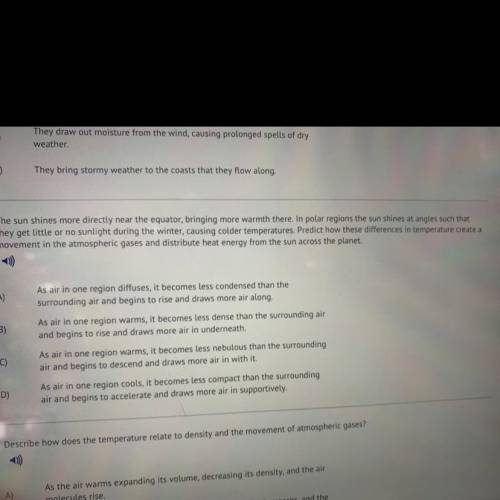
The sun shines more directly near the equator, bringing more warmth there. In polar regions the sun shines at angles such that
they get little or no sunlight during the winter, causing colder temperatures. Predict how these differences in temperature create a
movement in the atmospheric gases and distribute heat energy from the sun across the planet.
A)
B)
As air in one region diffuses, it becomes less condensed than the
surrounding air and begins to rise and draws more air along.
As air in one region warms, it becomes less dense than the surrounding air
and begins to rise and draws more air in underneath.
As air in one region warms, it becomes less nebulous than the surrounding
air and begins to descend and draws more air in with it.
As air in one region cools, it becomes less compact than the surrounding
air and begins to accelerate and draws more air in supportively.
C)
D)


Answers: 2


Another question on Chemistry


Chemistry, 22.06.2019 13:00
Is 9 correct? and can someone me with 10? it’s due tomorrow, you
Answers: 1

Chemistry, 22.06.2019 21:30
How can the periodic table be used to predict the behavior of elements?
Answers: 1

Chemistry, 22.06.2019 22:00
The diagrams to the right show the distribution and arrangement of gas particles in two different containers. according to kinetic-molecular theory, which of the following statements is true? check all that apply. if the temperatures of both containers are equal, container a has greater pressure than container b. if the volume of container a decreased, its pressure would decrease. if the pressure in both containers is equal, container a has a lower temperature than container b.
Answers: 2
You know the right answer?
The sun shines more directly near the equator, bringing more warmth there. In polar regions the sun...
Questions

History, 08.10.2020 01:01


English, 08.10.2020 01:01



English, 08.10.2020 01:01

Mathematics, 08.10.2020 01:01

Mathematics, 08.10.2020 01:01

Mathematics, 08.10.2020 01:01

English, 08.10.2020 01:01

Social Studies, 08.10.2020 01:01

English, 08.10.2020 01:01

Mathematics, 08.10.2020 01:01

English, 08.10.2020 01:01

Mathematics, 08.10.2020 01:01




Mathematics, 08.10.2020 01:01

Mathematics, 08.10.2020 01:01



